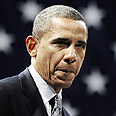
WASHINGTON - US President Barack Obama and Prime Minister Benjamin Netanyahu discussed the recent meetings between Israeli and Palestinian negotiators in Jordan, as well as the recent developments in Iran, the White House said Thursday evening.
The White House said that during the phone conversation Obama "reaffirmed his commitment to the goal of a comprehensive and lasting peace in the region."
Related articles:
- Israeli officials: Obama too soft on Iran
- US denies role in Iranian scientist's death
- Romney blasts Obama on Israel, Iran
- Romney blasts Obama on Israel, Iran
"The two leaders also discussed recent Iran-related developments, including the international community’s efforts to hold Iran accountable for its failures to meet its international obligations," the White House said in a statement.
"The president reiterated his unshakable commitment to Israel’s security, and the president and the
prime minister promised to stay in touch in the coming weeks on these and other issues of mutual concern."
Obama and Netanyahu spoke a little more than a day after Iranian nuclear scientist Mostafa Ahmadi Roshan – who served as the deputy director of the Natanz uranium enrichment facility – was assassinated in Tehran on Wednesday.
Iran immediately accused Israel and the United States of perpetrating the hit. Washington and Jerusalem have remained largely mum on the subject.
Japan gave a boost Thursday to the US campaign to sanction Iran over its nuclear program, pledging to buy less Iranian oil, a day after China reacted coolly to the US effort.

'Mutual concern.' Netanyahu (L) and Obama (Archive photo: Reuters)
Iran's "nuclear development problem can't be ignored by the world, so from that perspective we understand the US actions," Finance Minister Jun Azumi told reporters after meeting with US Treasury Secretary Timothy Geithner, who was visiting Tokyo after two days in Beijing.
Japan imports about 10% of its oil from Iran, Azumi said.
"We plan to start reducing this 10% share as soon as possible in a planned manner," he said.
Japan's quick agreement contrasts with China's public silence on the matter during Geithner's visit there.
A diplomat who briefed reporters about an upcoming Middle East trip by Premier Wen Jiabao repeated earlier government statements rejecting sanctions as a way to resolve the dispute with Iran.
Geithner's trip to Asia's two largest economies is part of a global lobbying effort to win support for the sanctions aimed at halting what Western governments say is Iran's effort to develop nuclear weapons. The sanctions, targeting the oil industry, would bar financial institutions from the US market if they do business with Iran's central bank.
Iran has threatened to respond to sanctions by shutting the Strait of Hormuz, a transit route for a fifth of the world's oil.
China has criticized US sanctions on Iran, approved by President Obama on New Year's Eve, as improper and ineffective. Beijing supported UN sanctions on Iran's nuclear program but says action should be multilateral.
"To place one country's domestic law above international law and press others to obey is not reasonable," Foreign Ministry spokesman Liu Weimin told reporters at a regular briefing Wednesday.
India, on the other hand, announced it will keep doing business with Tehran and sees no reason to seek a waiver from the US that would protect buyers of Iranian oil from a fresh round of sanctions,
"Why should we seek waiver from the US? We have done business with Iran earlier and will continue to do business," a senior minister in India's cabinet, who has knowledge of the matter but did not want to be named as the issue is confidential, told Reuters on Thursday.
AP, Reuters contributed to the report















